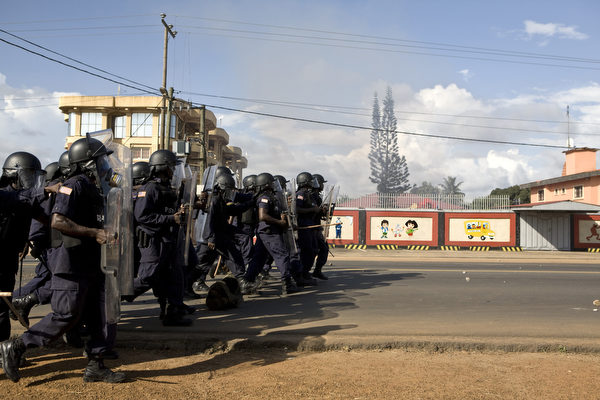
Yesterday’s vote was marred by violence the day before. It looks like badly-trained and led police are to blame, but we will see.
Many eyes will be on violence in Liberia. Last week colleagues and I put out a note on what our data say about trends in conflict and cooperation in the country. In my travels I neglected to blog. The punchlines:
- Violence of all types has been falling over time.
- Most people think that the police and military are wasteful and corrupted, but most say they prefer them to the UN peacekeeping forces (of course, we’ll see if they still agree after this week’s events).
- Probably the most prevalent conflicts, and the ones that escalate into violence most often, are related to land. But the violent and persistent land conflicts are not the majority — most land conflicts are solved in the system to parties’ satisfaction.
- The worrisome news: community cohesion and trust have been worsening. Even though violence has been decreasing, people say they feel less trusting, less respected, and less safe than before. Ethnic relations are no better (and possibly worse) and ethnic majorities is probably the leading correlate of conflict.
Read the full Part 1 of the report. Part 2 (on conflict prediction and early warning) should be available soon.
(Also see the related impact evaluation of a rural peace-building and civic education program.The unexpected finding: the program increased disputes and conflicts, though probably reduced the proportion of violent ones. Be careful when you stir the pot.)
What else to read on Liberia? Recent writings I recommend:
- The ICG report on Liberia politics is still probably one of the best overviews and introductions
- Scarlett Lion’s election and riot photos. (One of which is above)
- This report on conflict patterns and political attitudes by the Berkeley Human Rights Center
- Yale’s Alexandra Hartman on land conflicts
- Ben Spatz in today’s CS Monitor on why Liberia should still deserves US aid
- A study of the impacts of the peacekeeping mission
- And I would keep an eye on the Africa Confidential site for intelligent post-election analysis
Suggestions from readers on recent publications or articles?

4 Responses
I agree that it looks like the poor training of the police was ultimately to blame–there is never any excuse for firing into a crowd of unarmed protesters. However, I think it should also be pointed out that the CDC’s actions up until then, and now, are also troubling. Boycotting the elections, throwing rocks at the police and now continuing the tensions post-election is not in the greater interests of the country, in my humble opinion.
on a VERY unrelated note, have you seen the daily show episode with Leymah Gbowee, yet?
http://www.thedailyshow.com/watch/mon-november-14-2011/leymah-gbowee
I wonder … violence in the US is mostly implemented by young men. Young men are not interested in land, they are interested in establishing dominance over a particular social territory. They do this for the sole purpose of acquiring sex.
Once society quits regulating sex then young men are left to fend for themselves in a very competitive sexual marketplace. It’s pretty clear that there is a correlation, at least in the US, between social regulation of sexual arrangements, which can be approximated by rates of bastardism*, and violence.
*My use of the term bastardism was intentional. The only real way for society to control female sexual behavior is to threaten their actual, or prospective, childrens’ future. In the past, when a child was labeled a bastard it made them a pariah in society, which decreased the happiness of their mothers. Because of this, women took great pains to not have bastard babies.
Catherine Boone is working on a book on land conflict in rural Africa that you might be interested in, if you have not already seen a copy. It speaks to the question of why land conflict becomes widespread in some areas and stays more localized in others.
If you are interested in further studies on land conflicts in Liberia see the series of reports done by the NRC on this issue. http://www.nrc.no/arch/_img/9568756.pdf
and
http://www.nrc.no/?did=9481900
Enjoy!